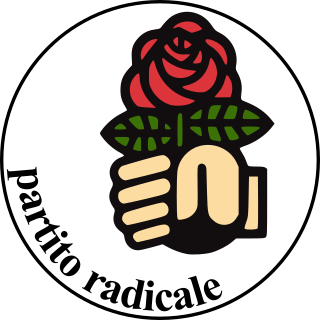Related Research Articles
Radical Party may refer to any of a number of political parties professing the progressive-liberal ideology known as Radicalism:
The Labour Party is a social democratic political party in the Netherlands.

The Radical Party, officially the Republican, Radical and Radical-Socialist Party, is a liberal and social-liberal political party in France. Since 1971, to prevent confusion with the Radical Party of the Left (PRG), it has also been referred to as Parti radical valoisien, after its headquarters on the rue de Valois. The party's name has been variously abbreviated to PRRRS, Rad, PR and PRV. Founded in 1901, the PR is the oldest active political party in France.

The Luxembourg Socialist Workers' Party, abbreviated to LSAP or POSL, is a social democratic, pro-European political party in Luxembourg. The LSAP sits on the centre-left of the political spectrum.

The Democratic Party, is the major liberal political party in Luxembourg. One of the three major parties, the DP sits on the centre to centre-right, holding moderate market liberal views combined with a strong emphasis on civil liberties, human rights, and internationalism.

The Radical Party was a liberal and libertarian political party in Italy.
Social liberalism is a political philosophy and variety of liberalism that endorses social justice, social services, a mixed economy, and the expansion of civil and political rights, as opposed to classical liberalism which favors limited government and an overall more laissez-faire style of governance. While both are committed to personal freedoms, social liberalism places greater emphasis on the role of government in addressing social inequalities and ensuring public welfare.

The Free-thinking Democratic League was a progressive liberal political party in the Netherlands. Established in 1901, it played a relatively large role in Dutch politics, supplying one Prime Minister, Wim Schermerhorn. The League is a predecessor of two of the major Dutch political parties, the conservative liberal People's Party for Freedom and Democracy (VVD) and the social democratic Labour Party (PvdA). The social liberal Democrats 66 also claims that it and the VDB are ideologically connected.
This article gives an overview of liberalism in Austria. It is limited to liberal parties with substantial support, mainly proved by having had representation in parliament. For inclusion in this scheme it is not necessary that parties labeled themselves as a liberal party.
Liberalism and radicalism have played a role in the political history of Italy since the country's unification, started in 1861 and largely completed in 1871, and currently influence several leading political parties.
This article gives an overview of liberalism in Luxembourg. While liberal thought has had a long history within Luxembourg, organized political liberalism has only been since 1904 when the Liberal League was formed. It wasn't until 1925 that a liberal party became relatvant and since then, a liberal party has been one of the three major political forces in the Grand-Duchy. It is limited to liberal parties with substantial support, mainly proved by having had a representation in parliament. The sign ⇒ denotes another party in that scheme. Not all parties listed have the word "liberal" in their names.

Radicalism was a political movement representing the leftward flank of liberalism between the late 18th and early 20th century. Certain aspects of the movement were precursors to modern-day movements such as social liberalism, social democracy, civil libertarianism, and modern progressivism. This ideology is commonly referred to as "radicalism" but is sometimes referred to as radical liberalism, or classical radicalism, to distinguish it from radical politics. Its earliest beginnings are to be found during the English Civil War with the Levellers and later the Radical Whigs.

The Italian Liberal Party was a liberal political party in Italy.
The Liberal League was a political party in Luxembourg between 1904 and 1925. It was the indirect predecessor of the Democratic Party (DP), which has been one of the three major parties in Luxembourg since the Second World War.

Socialism in Canada has a long history and along with conservatism and liberalism is a political force in Canada.
This article gives an overview of socialism in the Netherlands, including communism and social democracy. It is limited to communist, socialist, social democratic, and democratic socialist parties with substantial support, mainly proved by having had a representation in parliament. The sign ⇒ means a reference to another party in that scheme.
Gaston Diderich was a Luxembourgish politician and jurist. He was the Mayor of Luxembourg City from 1921 until his death in 1946, making his the longest uninterrupted tenure in the city's history. In addition, Diderich was a member of the Chamber of Deputies from 1918 until 1940, and again from 1945 until his death the following year.
The Independent Radicals were a centrist or conservative-liberal political current during the French Third Republic. It was slightly to the right of the more famous Radical-Socialist Party, and shared much of its historical radicalism. The prominent political scientist André Siegfried described them as "Social [that is, economic] conservatives who did not want to break with the Left, and who therefore voted with the Right on [economic] interests, and with the Left on political issues".
The Radical Liberal Party, abbreviated to PRL, was a Luxembourgian political party that existed from 1932 until 1945. It was the main party bridging the gap between the former Liberal League and the current Democratic Party.
Kakushin seitō(革新政党), meaning reformist political parties or progressive political parties, is an umbrella term used in Japan to refer to a variety of left-leaning political parties generally viewed as "anti-conservative." In the postwar period, it has generally been applied to democratic socialist, social democratic and socially progressive parties that seek to uphold Article 9 of the Japanese Constitution. Japan's "progressive parties" are basically opposed to constitutional amendments led by right-wing conservatives, so they are partly in solidarity with moderate liberal parties. "Kakushin" parties have been considered progressive or radical-liberal forces.
References
- ↑ Hearl (1988), p. 376
- ↑ Hearl (1988), p. 378
- ↑ "L'Histoire du DP". Democratic Party. Archived from the original on October 11, 2007. Retrieved 2008-04-19.